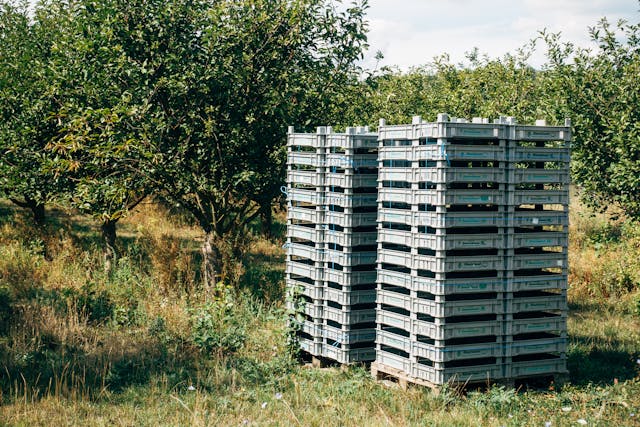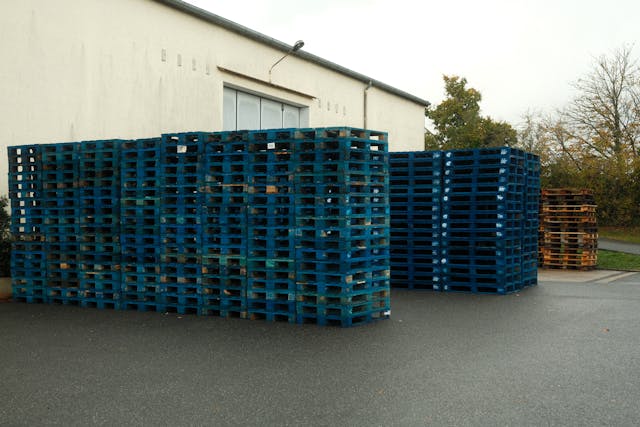As environmental consciousness grows, industries are under increasing pressure to adopt sustainable practices. Bundled pallets offer a practical and effective solution to reduce waste, optimize logistics, and minimize carbon emissions. These innovative packaging systems streamline operations and enhance supply chain efficiency by consolidating multiple pallets into a single, secure unit.
This guide will explore the multifaceted benefits of bundled pallets, from their impact on material reduction and waste minimization to their role in optimizing storage space and transportation efficiency.
What Are Bunded Pallets?
Bunded pallets, also known as spill containment pallets or secondary containment pallets, are specialized platforms designed to store and handle containers of hazardous or liquid substances safely. They are equipped with integrated bunds—spill containment basins or trays—that capture leaks, spills, or drips from stored items such as drums, Intermediate Bulk Containers (IBCs), or tanks. These pallets are vital in environmental protection, workplace safety, and regulatory compliance.

The Role of Bunded Pallets in Sustainable Industrial Practices
Beyond their functional utility, bunded pallets significantly enhance safety, efficiency, and environmental stewardship. Here is an elaboration on how bunded pallets promote sustainable industrial practices:
- Preventing Environmental Contamination
Environmental protection is at the core of sustainability, and bunded pallets directly address this concern by preventing hazardous spills from contaminating soil, waterways, or local ecosystems. These pallets are designed with built-in containment basins that capture leaks and spills from drums, containers, or tanks.
Without such measures, even minor spills can lead to long-term environmental damage, including the poisoning of groundwater and harm to aquatic life. By acting as a physical barrier between harmful substances and the environment, bunded pallets enable industries to meet strict environmental standards while showcasing their commitment to preserving natural resources.
- Supporting Waste Reduction
When hazardous substances spill, the result is environmental harm and material wastage. Bunded pallets reduce waste by allowing industries to recover leaked liquids for reuse or proper disposal. This capability aligns with the principles of a circular economy, where materials are kept in use for as long as possible.
Instead of discarding spilled liquids, businesses can save resources, reduce purchasing costs, and lower waste output. Bunded pallets’ waste-reducing nature makes them invaluable assets for companies striving to minimize their ecological footprint and improve operational efficiency.
- Promoting Regulatory Compliance
Industrial operations involving hazardous materials are often subject to stringent environmental regulations. Non-compliance can lead to hefty fines, legal challenges, and reputational damage. Bunded pallets help businesses meet these regulatory requirements by ensuring proper containment of hazardous substances. In doing so, they reduce the risk of accidental releases that could result in penalties.
Moreover, using bunded pallets demonstrates a proactive approach to safety and sustainability, fostering a culture of accountability. This protects businesses from liabilities and strengthens their standing with regulators, customers, and stakeholders.
- Enhancing Workplace Safety
Spills of hazardous liquids pose significant risks to workers, including chemical exposure and slip-and-fall accidents. Bunded pallets mitigate these risks by securely containing chemical spills before they spread across workspaces. This not only ensures the safety of employees but also minimizes disruptions caused by workplace accidents.
A safe work environment fosters employee well-being and productivity, integral to sustainable operations. By investing in bunded pallets, companies prioritize the health and safety of their workforce while maintaining uninterrupted workflows.
- Improving Resource Efficiency
Bunded pallets are designed for durability and are often constructed from materials such as high-density polyethylene, which is both robust and recyclable. Their long lifespan reduces the frequency of replacements, conserving resources and lowering the environmental impact of manufacturing new spill pallets.
Additionally, many bunded pallets are modular, allowing for flexible configurations that optimize storage solutions and handling. This adaptability enhances operational efficiency, reduces material waste, and supports sustainability by effectively utilizing resources.
- Supporting Green Certifications and ESG Goals
Incorporating bunded pallets into industrial practices can directly support a company’s efforts to achieve green certifications and meet Environmental, Social, and Governance (ESG) objectives. These certifications often require businesses to demonstrate robust environmental and safety measures, and bunded pallets provide a clear, practical solution.
By reducing environmental risks and improving operational safety, spill pallets help businesses align with sustainability benchmarks. This alignment strengthens their position in competitive markets and attracts eco-conscious investors and partners, showcasing their dedication to responsible operations.
- Promoting a Culture of Sustainability
Bunded spill pallets are more than functional equipment—they symbolize an organization’s commitment to sustainable practices. Their use encourages a culture of environmental responsibility within the company, reminding employees, partners, and stakeholders of the importance of reducing ecological impact.
By integrating bunded pallets into daily operations, companies create an environment where sustainability is prioritized at every level, fostering innovation and collaboration toward greener solutions. This cultural shift further enhances the company’s reputation as a leader in sustainable industrial practices.
Preventing contamination, reducing waste, ensuring compliance, and fostering a culture of sustainability demonstrate how practical innovations can support long-term environmental and economic goals.
Conclusion
By embracing bundled pallets, industries can significantly reduce their environmental impact while improving operational efficiency. This sustainable solution offers many benefits, from minimizing waste and conserving resources to optimizing storage and transportation. As the world increasingly prioritizes eco-friendly practices, bundled pallets position businesses at the forefront of sustainable innovation.




